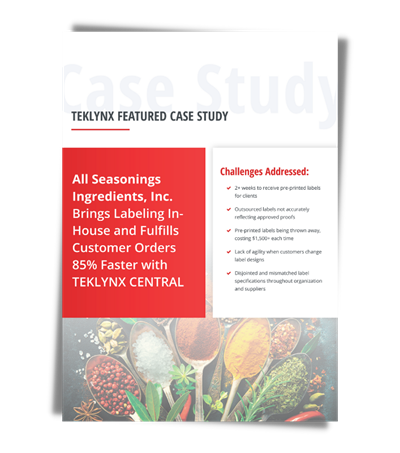Выберите ваш регион и язык для обеспечения максимального удобства при использовании веб-сайта
Выберите ваш регион и язык для обеспечения максимального удобства при использовании веб-сайта

Between the transformation of production and the challenges presented by COVID-19, the manufacturing industry has undergone a lot of changes in 2021. Workforce shortages and supply chain instability are causing a decline in operational efficiency and margins, and businesses are looking for ways to recoup costs from the global pandemic.
Looking forward, business agility and technology adoption is even more critical for organizations to operate through the turbulence from an unusually quick economic rebound and to compete in the next growth period. This blog will explain four trends in the manufacturing industry and how labeling will support those trends through 2022 and beyond so you can set your company up for success.
If you’re unsure where to start with labeling, get in touch with a TEKLYNX expert to assess your current environment and help you find the best barcode labeling software solution to fit your business.
Automation is vital in helping manufacturers compensate for a worker shortage and eliminate time-consuming and error-prone processes. Automation technology also sustains the need to continually improve operations to support e-commerce and an industry shift from B2B to B2C.
By automating labeling processes, companies can easily make their workflows faster and more efficient, enabling them to do more with less.
Learn how Flex-Strut increased their print speed by 100% or how Nemak automated their labeling process to reduce errors and achieved 98% labeling accuracy.
According to Gartner, the average cost of IT downtime is $5,600 per minute, and 98% of organizations say a single hour of downtime costs over $100,000. Planned maintenance or software upgrades gives manufacturers the opportunity to schedule downtime around their own production schedules.
Also, according to Identity Theft Resource Center (ITRC) research, the total number of data breaches through September 30, 2021, has already exceeded the total number of events in 2020 by 17%, with 1,291 breaches in 2021 compared to 1,108 breaches in 2020. This puts additional pressure on IT teams to ensure all applications are secure, backup or disaster recovery plans are documented, and software is protected under maintenance agreements or technical support.
We highly recommend companies stay on the most current version of their barcode labeling software to avoid the risk of production downtime and ensure compatibility with new technology. Subscription-based licensing includes priority technical support and free version upgrades, ensuring you always have access to the most up-to-date software and can upgrade at a planned time.
Plus, enterprise label management solutions have evolved to include automatic back-up server functions, so if your primary server shuts down, your secondary server automatically becomes the primary server. Once your primary server is up and running, the secondary server switches to back-up, so downtime in your labeling process is one less thing to worry about.
See how Dot Foods leverages CODESOFT and SENTINEL to meet their internal labeling security requirements to maintain a high availability – or always on – manufacturing environment.
Industry 4.0 – shorthand for the fourth industrial revolution – describes the trend towards smart factories in manufacturing. Gartner defines smart factories as a concept to describe the application of different combinations of modern technologies to create a hyperflexible, self-adapting manufacturing capability. Smart factories are an opportunity to create new forms of efficiency and flexibility by connecting different processes, information streams, and stakeholders in a streamlined fashion.
This conceptualizes the rapid change in technology and processes due to increasing interconnectivity and automation within manufacturing. Foundational technology such as cloud computing enables increased visibility, scale, and speed – making Industry 4.0 possible.
Cloud-enabled and centralized enterprise label management solutions allow companies to handle label design, approval, printing, and reporting from a single location. Companies are adopting and seeing results from more connected, reliable, efficient, and predictive processes.
Managing operations in a sustainable and environmentally responsible manner is now a business imperative across the manufacturing industry. Companies require more traceability and visibility into where products go and product use to measure the impact on the environment and eliminate waste.
Tracking products throughout the supply chain starts with a barcode. GS1 standards provide the framework for real-time tracking, traceability, and supply chain efficiencies. It’s the global language of business between your suppliers, partners, and customers. Creating GS1 barcodes efficiently and accurately is crucial for day-to-day operations of businesses around the globe.
Fun fact: According to GS1, the retail industry is embarking on one of the biggest changes since the original introduction of the barcode – adoption of two-dimensional (2D) barcodes to enhance the experiences of consumers, brands, retailers, and everyone in between. Learn more about GS1 and 2D barcodes.
 Beyond tracking products, companies should also be assessing any physical waste caused by labeling within their four walls. All Seasonings Ingredients, Inc. experienced large amounts of pre-printed label stock being wasted – costing thousands of dollars and taking up space in their facility – before bringing label design and printing in-house.
Beyond tracking products, companies should also be assessing any physical waste caused by labeling within their four walls. All Seasonings Ingredients, Inc. experienced large amounts of pre-printed label stock being wasted – costing thousands of dollars and taking up space in their facility – before bringing label design and printing in-house.
Read the full case study. Also, our eBook, Achieving Lean Labeling Success, provides strategies to help you use lean labeling to reduce waste, increase efficiency, and grow your bottom line.
TEKLYNX has over 30 years of experience helping companies around the word build efficient and effective labeling environments. We understand every industry and business is different and have their own unique labeling challenges or goals.
Let TEKLYNX assess your current labeling process for improvements – such as automatic label printing or centralization of label management – so your labeling environment is stable and agile enough to change with industry labeling trends in 2022 and beyond.
Doug Niemeyer is the President & General Manager at TEKLYNX Americas. He leverages his 25+ years of sales & marketing experience in technology and leadership to help grow the business. His passion for leadership, insatiable curiosity, and competitive spirit help to drive success, encourage progress and development while ensuring teams hold positive customer experiences in the highest regard, all with the purpose of helping companies barcode better. When he is not working you can find him in a gym, on a field or golf course playing or coaching.
The COVID-19 pandemic has forced companies to rethink their package labeling processes. Manufacturing organizations that have traditionally relied on the use of desktop-based labeler printers with a manual label application process (application by hand) are facing increasing challenges regarding labor shortages driven by the pandemic.
READ MORE
Companies with multiple locations have unique labeling challenges. When its locations are spread around the world, those challenges are magnified. Better connections are essential in a global labeling environment, so companies should consider how label management software can streamline operations and improve international connectivity.
READ MORE
Supply chain disruptions can strike anytime, often when least expected, creating uncertainty for businesses. Many companies are unprepared to handle large-scale, unplanned disruptions. Factors like human error or natural disasters can delay products from reaching the market, impacting essentials such as getting food on tables and medicine to those who need it. Additionally, challenges like labor shortages, geopolitical tensions, and global events further slow down manufacturing and distribution processes.
READ MORE© Авторские права 2025 TEKLYNX CORPORATION SAS. Все права защищены.
What do you think? Leave us a comment.
Comments will be reviewed and are subject to TEKLYNX’ comment policy. Your email address will not be published publicly.